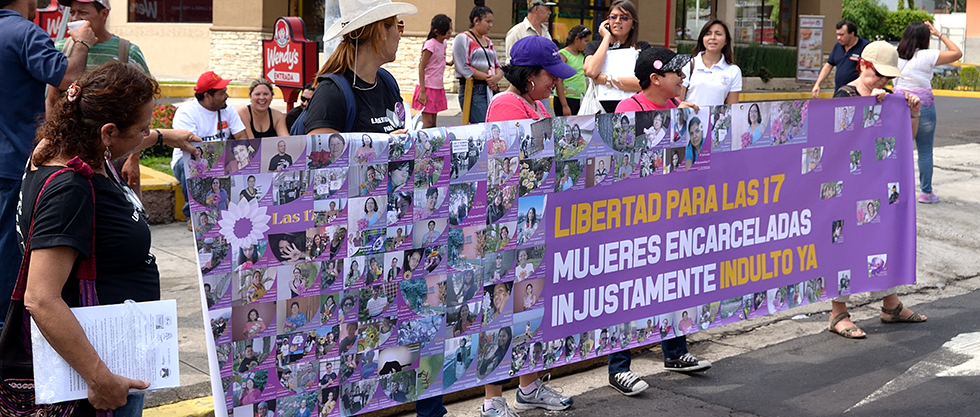El Salvador: Committee remains concerned about abortion, detention, indigenous peoples and LGBTI persons
Published on 26 Mar 2018, 01:35 PM
 Women in El Salvador ask for the liberation of 17 women prosecuted for the crime of abortion
Women in El Salvador ask for the liberation of 17 women prosecuted for the crime of abortion
The fourth periodic report of El Salvador was reviewed by the Committee on the 13th and 14th March 2018. The members of the Committee noted the efforts of the State and its willingness to engage in the dialogue.
One of the main issues that was raised by the Committee was the criminalization of abortion and the prosecution of women for this crime. The Committee also raised issues concerning pre-trial detention and conditions of detention, indigenous population and discrimination against LGBTI persons.
Other concerns were the investigations on the more than 10.000 cases of enforced disappearances during the armed conflict, the treatment of people with mental disabilities, harassment against human rights defenders and violence against women.
The webcast is available here: part 1 and part 2
"According to the information that we received the rate of occupation in prisons is at 300% and sometimes even 346%, so that means that prisons have population that exceeds by three times the usual capacity"
- Yadh Ben Achour, Member of the Committee
Abortion
The Committee expressed serious concerns regarding the total prohibition and criminalization of abortion, an issue that pushes women to practice unsafe abortion. The Committee raised the fact that from 2000 to 2011 a total of 129 women have been convicted for abortion and 27 women still remain in prison because of this crime. The State assured to be implementing efforts to decriminalize abortion in cases of rape, fetal malformation and cases where pregnancy represents a threat to the health of the woman. They argued that the judiciary and the legislative power have been the obstacles for the decriminalization of abortion, previously proposed by the executive. Also, the State claimed that Teodora Vasquez, a woman convicted to prison for 30 years under the crime of abortion, had just been liberated after 10 years behind bars as step forward towards a future decriminalization policy.
Pre-trial detention and conditions of detention
The Committee noted on the issue of pre-trial detention, both administrative and protective, that the period of administrative detention either in cases of flagrantia or arrest warrant was in practice extended to six days. They required the delegation to provide information about the time limits of the administrative detention, highlighting the fact that it should not exceed 48 hours. They also asked information about the number of persons in preventive detention. The State stated before the Committee that administrative detention should not last more than 72 hours, because exceeding that time would cause the annulation of the entire criminal process. Among other facts related to detention, according to the delegation, at the time of the session 32% of the prisoner population remain under the regime of preventive detention.
The Committee has also raised serious concerns about conditions of detention, and in particular the overcrowding in prison facilities. The prisons exceed their capacity to more than 300%, creating problems related to health, drinking water, ventilation, temperature and power energy. In this regard, the State assured to have been implementing policies to increase the capacity and to improve the conditions in prisons. The rate of overcrowding has been reduced to 210%, and they expect that with the construction of the prison "La Esperanza" the rates will descend to 174%. However, the Committee noted that constructing new prisons is not going to solve the issue, if pre-trial detention continues to be widespread and alternatives are not considered.
Indigenous population
The Committee has required information concerning the disparity in the official statistics of people belonging to indigenous communities: the numbers range between 0.23% and 12% of the entire population and according to certain NGOs, the government is using the numbers to avoid its obligations towards them. The Committee required the State to provide official statistics concerning the indigenous population. Even though the delegation did not provide statistics, they assured to be working on a census to determine the percentage of the indigenous and afro-descendent populations.
On the other hand, the Committee asked the State to explain their policies to overcome discrimination and inequality of indigenous peoples in El Salvador. 61% of the indigenous population in El Salvador lives below the poverty rate, and 38% of them even lives in extreme poverty. The State did not provide further information on this matter.
Discrimination against LGTBI persons
The Committee raised the issue of discrimination against LGBTI persons, in particular the problems of transgender people regarding access to identity cards that match their real gender identity. The State expressed that this issue has been challenging for the authorities, however, they had been conducting studies to improve this practice.
Another issue that concerned the Committee was the impunity for crimes committed against LGBTI persons. It required the State to provide information concerning the practices developed to overcome this situation. The delegation explained that in 2017 a specific policy had been implemented for the attention of the LGBTI persons as a result of dialogues and discussions with NGOs specialized in this issue.
 Women in El Salvador ask for the liberation of 17 women prosecuted for the crime of abortion
Women in El Salvador ask for the liberation of 17 women prosecuted for the crime of abortion

